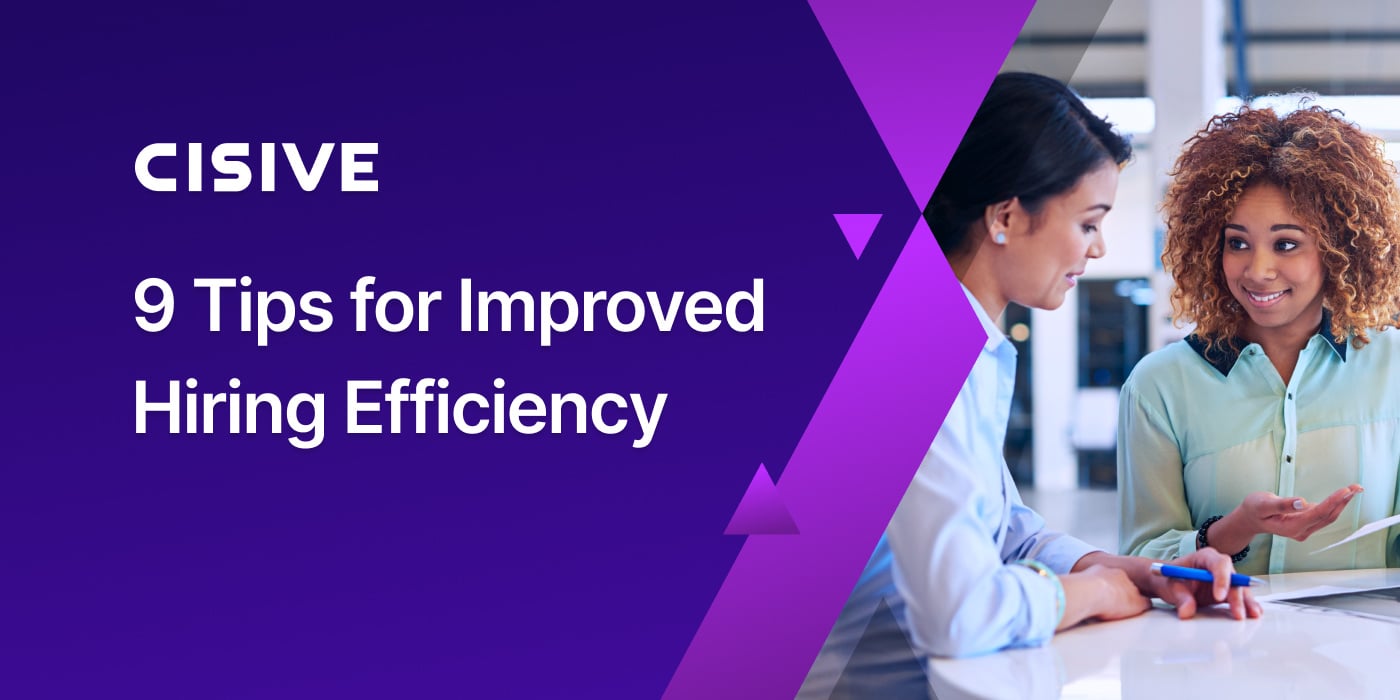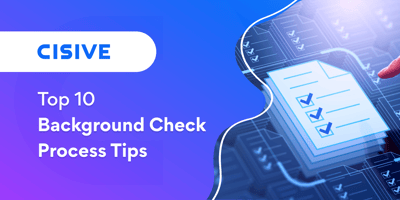

Employees are the heart of your company. Their salaries and benefits are also most companies’...

Hiring has more than its fair share of challenges. From getting your job posting viewed to onboarding and retaining talent, a huge amount of time and expense goes into the process. To top it all off, leadership is always pressuring you to spend less money.
Want to succeed in recruiting? One of the best ways is by having an efficient hiring system that optimizes your team’s time and resources.
Key TakeawaysHere’s what you need to know about hiring efficiency:
|
Hiring efficiency means having a defined, measurable recruitment process that yields high-quality hires in a cost-effective and timely manner. This is also called “recruiting efficiency.”
With an efficient recruitment system in place, you’ll be better able to identify problems in your hiring and make improvements. Achieving hiring efficiency means using a combination of technology and people (i.e., your staff) to define and execute the process.
Measuring hiring efficiency is important because business leaders know recruiting is notoriously expensive and time-consuming. As an HR professional, you’re under pressure to show a return on that investment. Metrics can give you insight into where you might be able to deliver cost savings over time.

As you read this article, think about ways to make your hiring more efficient. As you do, take time to contemplate these considerations that may affect how your organization proceeds:
There are many ways to measure hiring efficiency, some of which may be better for your company than others. Possible metrics include:
There are even more hiring metrics you could track. You could look at candidate quality or the average time between resume screening and phone screening. You could also look at the average time between interviewing and making a final decision.
Organizations frequently use applicant tracking systems (ATS) and other software to track and analyze these metrics. When you track metrics like these, you can easily see what parts of your hiring process need improvement.

Recruiting and hiring are ongoing efforts with many associated costs. HR departments need to demonstrate that they’re always looking for ways to become more efficient and effective. Here are a few ways an efficient hiring process can positively impact your organization.
Once you hire someone, you need them to stay. Thousands of dollars were invested to find and hire the person; at the very least, they should be around long enough to recoup that investment.
Ideally, you’ll find qualified candidates who stick around for years, thus helping the business achieve stable, predictable growth. A clear, efficient hiring process can set the stage for long-term employee satisfaction. And ongoing monitoring can help ensure you’re quickly alerted of any infractions or red flags that could affect their employment.
A poor hiring strategy makes it hard to find the right candidates, which means a position stays open longer than it should. Other employees may take on additional duties during that time due to understaffing, potentially causing burnout.
An efficient hiring process can help you fill openings quicker with the right person so you don’t have long coverage gaps.
Hiring efficiency lets you fill roles quickly, reducing your hiring costs and increasing profitability. But that’s not the only benefit. Good hiring is also about finding the candidate who fits in and can contribute effectively.
When you have good hiring efficiency, you can attract higher-quality candidates. As a result, the people you bring in are more likely to be qualified for the role. When they are ready to hit the ground running, they can positively impact revenue and profitability.
No one likes to work in an environment where new people are always coming and going or where positions are vacant for months. A revolving door can negatively impact employee morale and productivity. Hiring strategies that bring in the right people at the right time lead to better job satisfaction and higher morale.
Whatever industry your company is in, job candidates often know how recruiting is supposed to feel. You’re often dealing with sophisticated professionals who draw conclusions about your company based in part on how smooth or rocky the recruiting is. Ensure your hiring process is up to the expectations of the best candidates.

Now that you know what hiring efficiency is and why it’s so important, you’re probably wondering where to start. The nine strategies outlined below can help you optimize your hiring.
The first step to solving a problem is understanding it. Come together with your HR team and hiring managers and have an honest conversation about hiring issues. Is first-year attrition too high? Does it take too long to hire, even for roles that aren’t particularly specialized or high-value?
Using your hiring metrics and the feedback, everyone can understand what issues you’re trying to tackle. For example, say your time to hire is longer than industry standards. You can dig in and see where the issue is. You might discover that this issue could be remedied by using a faster background check service to get candidates starting earlier.
Industries like healthcare, finance, tech, and transportation have unique aspects when it comes to workforce strategies. You’re looking for very talented people with specific skills.
Those people know their value, and they know how they want to be treated. If other companies are more communicative and more efficient, it can impact how these people perceive your entire organization.
And no matter the industry, your hiring practices are affected by myriad regulations and laws. You’ll need to adhere to all federal, state, and local laws when recruiting. This means staying abreast of laws about background checks, drug screens, and much more. As you improve the efficiency of your hiring, make sure you stay in compliance.
A recruitment strategy is a structured approach to sourcing, screening, and hiring qualified job candidates. A clear strategy helps HR and managers understand their roles and how they can all contribute to smoother recruiting.
Recruitment strategy covers everything from your website Careers page to how you handle internal career advancement. Read our in-depth article on developing an effective recruiting strategy for ideas and tips.
The job description is the key connection between the organization and the pool of potential candidates. To be efficient in hiring, you want to do whatever you can to ensure the people applying to your job are the right people. Excellent job descriptions help make that happen.
Make sure your descriptions clearly describe the qualifications needed for the role. Also cover the job responsibilities and expectations.
You should also consider including the compensation range. In fact, an increasing number of states are requiring job postings to include compensation information. Knowing the compensation helps people decide whether it's a job they would accept if they received an offer.
If you plan to have candidates go through multiple rounds of interviews, make sure each is valuable for the candidate. Every interview should be somewhat different; otherwise, the candidate will feel like you’re wasting their time. Make sure stakeholders doing interviews are differentiating those interviews enough.
Also, stakeholders who aren’t conducting the interviews should know their roles. Your behind-the-scenes staff should understand that what they do has an impact on hiring efficiency.
Put yourself in the candidate’s shoes. They want to know how the process is going and whether they’re being advanced. The worst thing you can do is fail to communicate with a candidate for extended time. They’re likely applying for other jobs, so you could lose out on them.
Even if they’re not applying elsewhere, they could get a negative impression of your company if you leave them hanging. Prioritize a positive candidate experience.
Remember the hiring metrics we mentioned earlier? Make sure you track them so you know where to make improvements. If your time-to-hire is increasing, figure out why. Use the data to continuously refine your sourcing strategies, job descriptions, and overall approach to recruiting and hiring.
HR analytics software, applicant tracking systems, and other talent management technologies can help your efficiency. On the other hand, they can complicate hiring if the software isn’t properly implemented or understood. Take time to evaluate software options. After you choose one, make sure your team knows how to use it properly.
You should also consider technologies outside of ATS, such as the solution you use for employment and identity verification. Background check software that integrates with your systems can boost overall hiring efficiency by speeding up time-to-hire and making onboarding quicker.
Here are more tips on streamlining employment verification using technology.
Background checks, including employment verification, education verification, and drug screening, must be efficient. Faster checks make your overall hiring process quicker. Working with a trusted background check provider can allow you to complete the verification process quickly, sometimes in hours rather than days.
In addition to helping you hit your recruiting metrics, doing background checks through Cisive mitigates your risk. We ensure your background checks comply with all applicable laws and regulations in the U.S. and internationally.
Now that you’re familiar with hiring efficiency, find out how Cisive’s experts and solutions can help you improve your company’s efficiency today. Set up a consultation with our hiring and recruitment specialists to learn more about how our background checks can be a part of your efficiency journey.
Author: Jenni Gallaway
Bio: Content Marketing Manager at Cisive. 8 years of experience in the background screening industry.
Let's Connect on LinkedIn
Employees are the heart of your company. Their salaries and benefits are also most companies’...

The healthcare industry is built on the physicians, nurses, clinicians, therapists, and support...

Imagine you hired a candidate after a search that took months. During that time, the other...